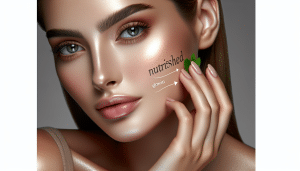Discover Ways You Can Improve Your Skin Naturally
Ella Knight September 26, 2025
Curious about how to achieve healthier, more radiant skin without harsh treatments? Uncover natural and science-backed options for enhanced skin wellness, including gentle routines and trending solutions that can fit into your daily lifestyle.
Understanding What Impacts Skin Health
Glowing skin starts with understanding the factors that influence its health. Environmental pollutants, UV exposure, diet, and stress all play significant roles in the appearance of your complexion. Many people notice seasonal changes in hydration, firmness, and overall tone, prompting curiosity about what truly works for maintaining skin wellness. Adopting a holistic view allows individuals to make informed decisions about their routines and product selections, feeling empowered to pursue gentle methods that support their natural beauty over time.
Scientific studies reveal that hydration remains one of the cornerstones of skin vitality. Water helps flush toxins, supports cell turnover, and enhances overall elasticity. Equally, applying a suitable moisturizer locks in the skin’s natural moisture barrier, helping prevent dryness and irritation. Certain nutrients, such as vitamins A, C, and E, are recognized for their roles in supporting cell regeneration and fighting oxidative stress. People seeking healthier skin often find that adjusting dietary patterns can complement topical skincare for enhanced results.
Understanding these underlying influences helps combat misinformation and supports realistic expectations. Research-backed routines emphasize gentle cleansing, targeted sun protection, and stress management as foundational pillars. Adopting daily habits like using sunscreen, choosing non-irritating cleansers, and engaging in mindful self-care practices can yield visible improvements. With scientific consensus highlighting the importance of prevention, rather than reaction, building a daily wellness routine becomes a rewarding approach for those interested in long-term skin health.
Daily Rituals for Healthy-Looking Skin
A healthy complexion is the result of consistent, supportive daily rituals. Cleansing gently, morning and night, removes pollutants and excess oil while protecting the skin barrier. Using lukewarm water preserves hydration, while avoiding harsh scrubbing reduces the risk of sensitivity. A splash of cold water after cleansing has long been popular among beauty enthusiasts for invigorating the face and minimizing the look of pores, although true pore size remains unchanged. Selecting a cleanser designed for your skin type ensures debris is lifted without disrupting natural oils.
Moisturizing immediately after cleansing can make a considerable difference for skin appearance and comfort. Skin experts agree that applying moisturizer while the skin is still damp helps lock in hydration more effectively. Individuals concerned about oily or congested skin may benefit from lighter, non-comedogenic moisturizers that provide nourishment without heaviness. Nightly application of facial oils containing antioxidants is gaining recognition as an option to amplify skin elasticity and boost overnight rejuvenation.
Sunscreen is another critical step in any daily routine, regardless of weather. UV radiation is a leading contributor to aging signs and uneven tone. Dermatologists recommend broad-spectrum SPF of at least 30. Re application is encouraged every two hours when exposed to the sun. For additional support, incorporating antioxidant serums or vitamin-enriched creams can create a layered defense against environmental stressors. Establishing these practices boosts skin vitality and encourages a sustainable approach to beauty.
Nutrition and Hydration: The Inside-Out Approach
Nutrition can significantly shape skin health. The foods consumed daily provide building blocks for new, healthy cells. Diets rich in antioxidants—found in colorful fruits and vegetables—help the body ward off oxidative damage that can dull complexion or speed visible aging. Omega-3 fatty acids, present in fish, chia seeds, and walnuts, have demonstrated positive effects on elasticity and moisture retention. Even minor dietary tweaks, such as reducing sugar or processed foods, may lead to subtle improvements in clarity and tone over time.
Hydration works from within. Drinking sufficient water each day assists the skin in maintaining plumpness and a youthful glow. Professionals suggest aiming for at least eight glasses of water daily, but needs may vary depending on climate, activity level, and individual differences. Herbal teas and water-rich foods like cucumber can supplement daily intake. Signs of dehydration often manifest in the skin as dullness or increased sensitivity, making regular hydration a low-effort way to promote balance and comfort.
Specific vitamins and minerals act as essential supporters. Vitamin C is crucial for collagen synthesis and is naturally found in citrus, bell peppers, and leafy greens. Zinc, a trace mineral, assists in healing and inflammation responses. People with balanced diets that include these elements sometimes observe faster recovery from blemishes or minor irritations. The inside-out strategy means pairing mindful nutrition with gentle topical care for a synergistic path to radiance.
Natural Ingredients Making a Difference
Interest in natural skincare ingredients continues to grow. Many look for plant-based extracts and oils that have stood the test of time—like aloe vera, chamomile, and green tea extract. Aloe soothes and hydrates, making it a reliable choice for those with sensitive or irritated skin. Chamomile offers calming benefits and is often included in gentle cleansers and masks. Emerging research has shown that green tea’s polyphenols may help reduce the impact of UV exposure, making it a valuable addition to serums.
Coconut oil, jojoba oil, and shea butter frequently appear in natural moisturizing products because of their emollient properties. While these ingredients suit some skin types, it’s important to note that individual responses may vary. Experts suggest patch testing when trying a new natural oil or butter. Botanical extracts like licorice root and witch hazel are recognized for their soothing benefits, and they cater to those hoping to even out skin tone or control mild redness.
Many contemporary beauty brands highlight naturally-derived actives in their product lines. However, not all natural products are automatically safer; purity, formulation, and suitability still play a role. Checking for third-party certifications and reviewing ingredient lists helps support wise choices. Ultimately, combining the wisdom of traditional botanicals with evidence-based science offers a promising direction for skin wellness seekers interested in transparency and sustainability.
Understanding Emerging Trends in Non-Invasive Skin Care
Non-invasive beauty treatments have gained popularity among those interested in skin rejuvenation without downtime. Options like LED light therapy and microcurrent facials are spotlighted for their gentle, pain-free application. LED treatments can help manage mild redness and enhance overall luminosity. Studies suggest these technologies stimulate natural processes to strengthen skin resilience. Beauty professionals recommend integrating treatments gradually, always following manufacturer guidelines for safety.
Other approachable trends include facial massage techniques, such as gua sha or rolling, which can temporarily enhance circulation and relieve tension. While the visual effects may be subtle, many find the ritual soothing and supportive for emotional wellness. At-home devices like gentle exfoliating brushes or ultrasonic scrubbers allow for customization, emphasizing comfort and moderation above all. This trend aligns with a growing preference for routines that are easy to maintain and less disruptive to daily life.
Some users explore over-the-counter acid exfoliants, such as lactic acid or polyhydroxy acids, favored for their mild renewal properties compared to traditional scrubs. Consistency, rather than intensity, often drives visible progress in skin quality. Dermatologists stress the importance of patch tests and gradual introduction of new products. This mindful, informed approach ensures skin wellness without unexpected side effects and encourages a balance between innovation and safety.
Building a Personalized Skin Care Plan
No single approach fits everyone. Building a personalized skincare routine calls for listening to your own skin and adapting as needed. Experts recommend keeping routines simple to start, observing how skin responds to each step. Adjustments can be made seasonally or in response to life changes, such as travel or stress. Consistency and patience remain central. Progress is often gradual, but steady routines nurture long-term benefits.
For those with persistent concerns such as acne, irritation, or pronounced sensitivity, seeking professional guidance is a wise step. Board-certified dermatologists or licensed estheticians are equipped to recommend tailored protocols. Many reliable clinics now offer both in-person and remote consultations, making access to expert advice more attainable. Combining professional input with tried-and-true daily habits fortifies one’s journey toward skin wellness.
The wellness and beauty community places high value on self-awareness and gentle experimentation with routines. Documenting reactions—positive and negative—helps build an informed strategy. Peer-reviewed studies and reputable sources lend additional support when exploring new options. Ultimately, treating skin wellness as a journey, rather than a destination, fosters resilience, confidence, and visible improvements over time.
References
1. American Academy of Dermatology. (n.d.). Skin care basics. Retrieved from https://www.aad.org/public/everyday-care/skin-care-basics
2. Harvard Health Publishing. (n.d.). Diet and skin: The connection. Retrieved from https://www.health.harvard.edu/staying-healthy/diet-and-skin-the-connection
3. Cleveland Clinic. (n.d.). The best vitamins and nutrients for skin health. Retrieved from https://health.clevelandclinic.org/best-nutrients-for-skin-health
4. National Center for Complementary and Integrative Health. (n.d.). Herbs at a glance: Aloe vera. Retrieved from https://www.nccih.nih.gov/health/aloe-vera
5. U.S. Food & Drug Administration. (n.d.). Sunscreen: How to help protect your skin from the sun. Retrieved from https://www.fda.gov/consumers/consumer-updates/sunscreen-how-help-protect-your-skin-sun
6. Mayo Clinic. (n.d.). Skin care: 5 tips for healthy skin. Retrieved from https://www.mayoclinic.org/healthy-lifestyle/adult-health/in-depth/skin-care/art-20048237







